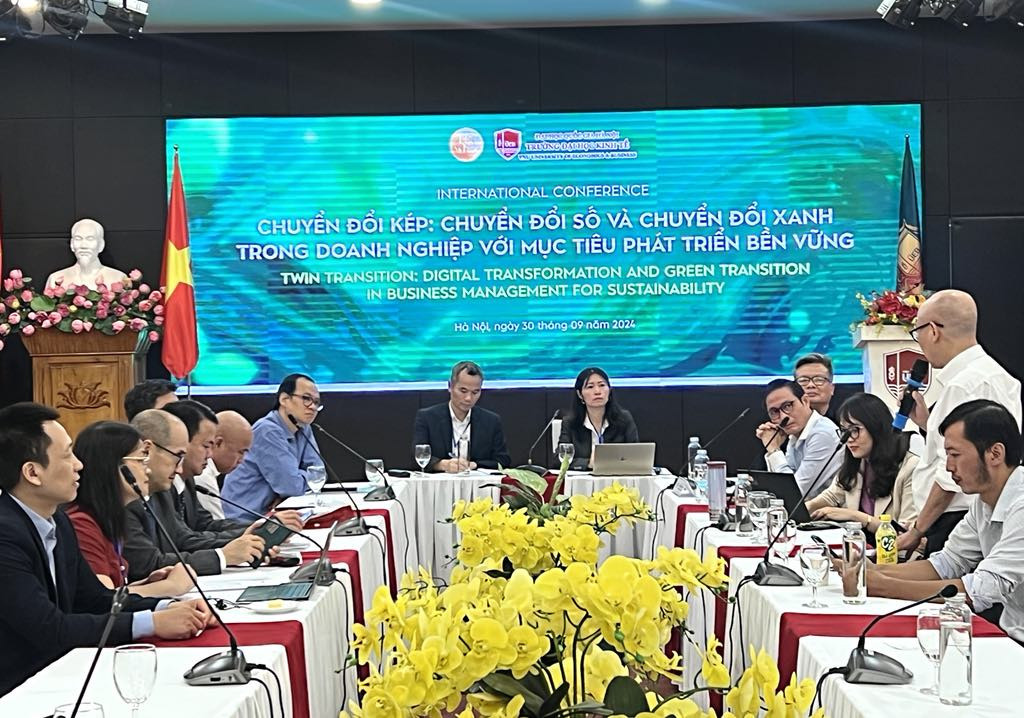
The topic of the AI’s (artificial intelligence) role in the twin transition was discussed by experts, researchers, businesspeople and other participants at an international workshop on the transition for sustainability held September 30.
Dr Hoang Xuan Vinh and Dr Tran Thi Hien from the University of Economics, Vietnam can consider the American and Chinese models when implementing the twin transition.
The US, for example, has developed the 4.0 agriculture strategy, integrating high technologies such as sensing, Big Data and automation, to improve productivity and product quality. Digital technology helps American farmers manage their entire supply chain, from production to consumption, ensuring product quality and production cost reduction.
In China, the digital transformation process has experienced many different periods, from building digital infrastructure to promoting new industries, such as e-commerce, AI and IoT (Internet of Things).
The country prioritizes advanced technologies such as AI and has made great efforts to build digital infrastructure, policies and strategies on digital economy; and has developed human resources and strengthened data protection.
Prof Dr Ho Tu Bao, Director of the Data Science Laboratory of the Institute for Advanced Study in Mathematics (VIASM), talking to VietNamNet on the sidelines of the workshop, said that the remarkable progress in science and technology have gradually digitized all entities and human activities, and these entities and activities can connect with each other in cyberspace via data.
AI is progressing very rapidly. Data serves as the ‘fuel’ for AI to operate.
In the digital era, the ongoing main object of labor is data, while the ongoing main tools of labor are digital technologies, such as AI. The capability of using AI and digital technologies will create big changes in labor power.
Developed countries have created the most scientific and technological products (including AI) used in digital transformation and green transition.
As for latecomers like Vietnam, this is an opportunity. Vietnam can make a breakthrough, because it is still at a low level and at an early phase of development. The creation and use of data and AI in Vietnam can be more revolutionary.
Bao said that Vietnam can only succeed in digital transformation and green transition if it conducts itself with a revolutionary spirit.
“In history, when a new industrial revolution occurs, some countries can take the opportunities to go ahead rapidly, while others just barely move ahead,” he explained.
“There’s only one revolution over many decades. So, if we cannot grasp the fourth industral revolution, we will lag further behind other countries. The distance between other countries which can make considerable progress in the revolution and Vietnam will be longer and will be more difficult for Vietnam to catch up,” Bao said.
Challenges
In recent years, in Vietnam, the concepts of digital transformation, green transition and AI application have been repeatedly mentioned. The level of interest by Vietnamese managers, scientists and businesspeople is the same as other countries in the region and the world.
However, Vietnam will have to overcome challenges to effectively utilize AI in the twin transition.
According to Bao, this must be a revolution of the whole people. The first thing that needs to be done is heightening people’s awareness about ‘digital’ and ‘green’. It is necessary to pay attention to producing workers who can create and use new digital technologies such as AI.
Of importance is also a reasonable legal framework to facilitate change. Many parts of the legal environment in Vietnam were designed before the fourth industrial revolution and before the real-digital environment was established. Therefore, it is now necessary to make changes to pave the way for digital production.
Vinh and Hien expressed their concern about the lack of qualified workers in the fields of information technology and digital transformation, especially experts in AI, cybersecurity and data.
While Vietnam’s digital infrastructure has improved significantly recent years, there still exists a big gap between large cities and rural and remote areas, which leads to a difference in accessing digital services.
Binh Minh